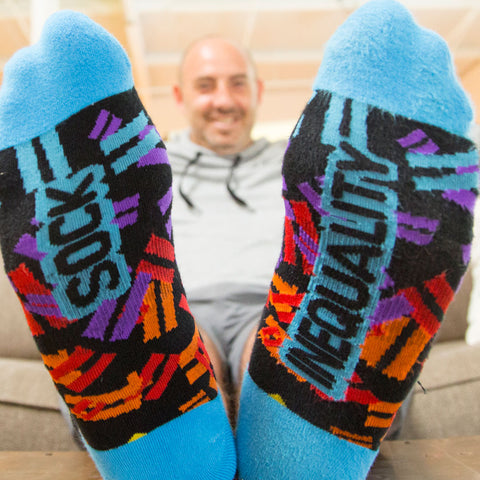Will Sock Problems fail? We already know the answer.
For 12 years, I’ve been Wonka's Everlasting Gobstopper: always going and never ending. Relentlessly pushing and nudging my creative agencies towards success and away from failure for one feared reason:
I was so terrified of the line...“I knew Berman would fail.”
In my head, I visualized former NYC coworkers laughing together at my plummet over wine, at dinner parties or during happy hour conversations. In my mind, nothing would be worse than having to tell a tale that included a tail-between-my-legs moment: an embarrassing “I had to shut down my agency” response.
So like a broken record, for years, this fictitious looping one liner continued to rule my uncontrolled internal monologues.
The irony...
To think that failing is a datapoint of failure was my biggest swing-and-a-miss failure over the years. Talk about #FailureFail

As we begin month 2 of our very own experimental ‘Courage Brand’, all I know for certain is that the team at Sock Problems will fail over and over again — fumbling around like a junior varsity football squad. I can confidently say we’re going to put it all out there fast — fully knowing we’re going to blunder it up on the regular.
So where might we fail early? The questions are endless.
Did we get the price right? Will our charity partners promote us? Can we launch a business, giving away 25-50% on every purchase and still remain IN business?
Captain Obvious Alert: we do no good if we put ourselves out of the “socking” game. But by giving our team permission to fail, assuming we learn from these failures, we can also create a speedy path for success.
If I had to guess, the next year of my “business life” will go like this: Provide cover. Experiment. Fail fast. Communicate. Learn. Pivot. Fail again. Course correct. Grow. Repeat.

So if failing isn’t failing...then what is true failure?
Failure is suffering from paralysis caused by waiting to be perfect. Failure is taking no action, even when your faith (inner belief/intuition) tells you it’s time to leap. Failure is failing to learn from past mistakes. Failure is not stepping up to the plate when that big, life-altering opportunity presents itself. Most of all, failure is anything that may bring serious regret.
If you have tracked my last few years, you know I’ve taken a deep dive at deconstructing courage. My working definition of courage is: knowledge + faith + action.
I genuinely believe that courage is regret insurance.
I have no regrets about leaving NYC. No regrets about moving on from my last two agencies. And no regrets about leaving the safe zone of a scaled business for start-up chaos. If Sock Problems or Courageous fail hard -- causing me to fall hard -- I can always move back to NY or go back to some version of agency life. (I call this the, "Yo Yo effect")
I believe failure is also that conversation that happens in your mind, where you speculate and visualize YOU failing before you even try. Sensing that fear is the very moment you have to push through — or face the likely possibility of serious regret down the line.
For most, the problem isn’t getting “back on that horse”. It’s that most never got on the horse in the first place.
To truly succeed is to risk failure. When you do take action, the learnings — even when you fail — will lead to personal growth and, I believe, eventual success.
Of course, this theory is being put to the test in real-time with Sock Problems. We can all watch this unfold as it happens; with all the failures, growth opportunities and hopeful successes of our "sock-some-problems-with-socks" experiment.
FINAL NOTE: If you manage people, how are you giving your team the permission to fail? How are you providing them with the proper cover? Are you clearly stating well before a success or failure that this is nothing more than an experiment? And, when the team fails, how are you sitting down with them — turning those dings into teaching opportunities?





